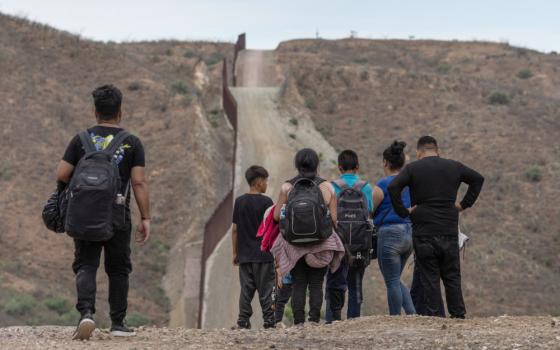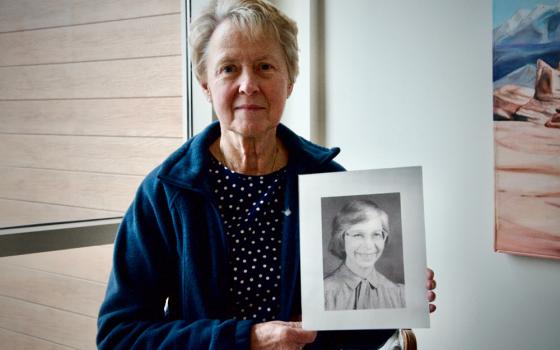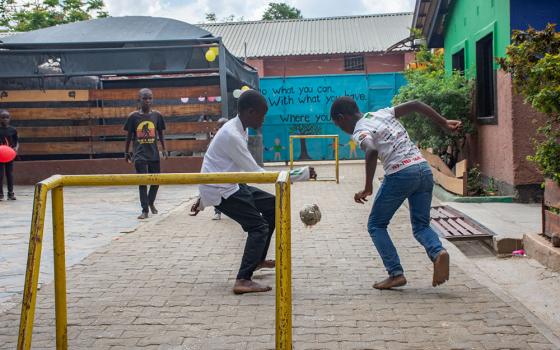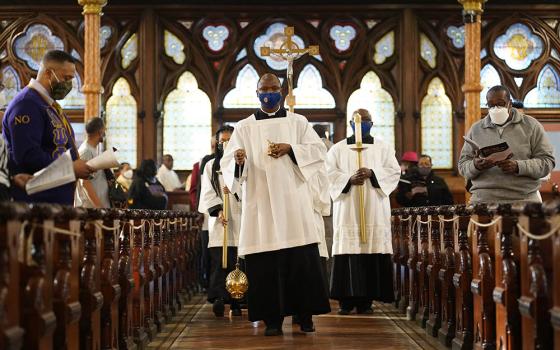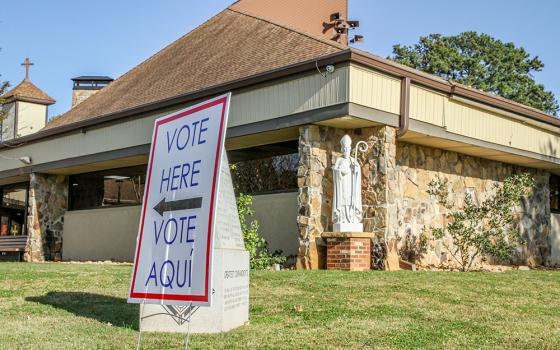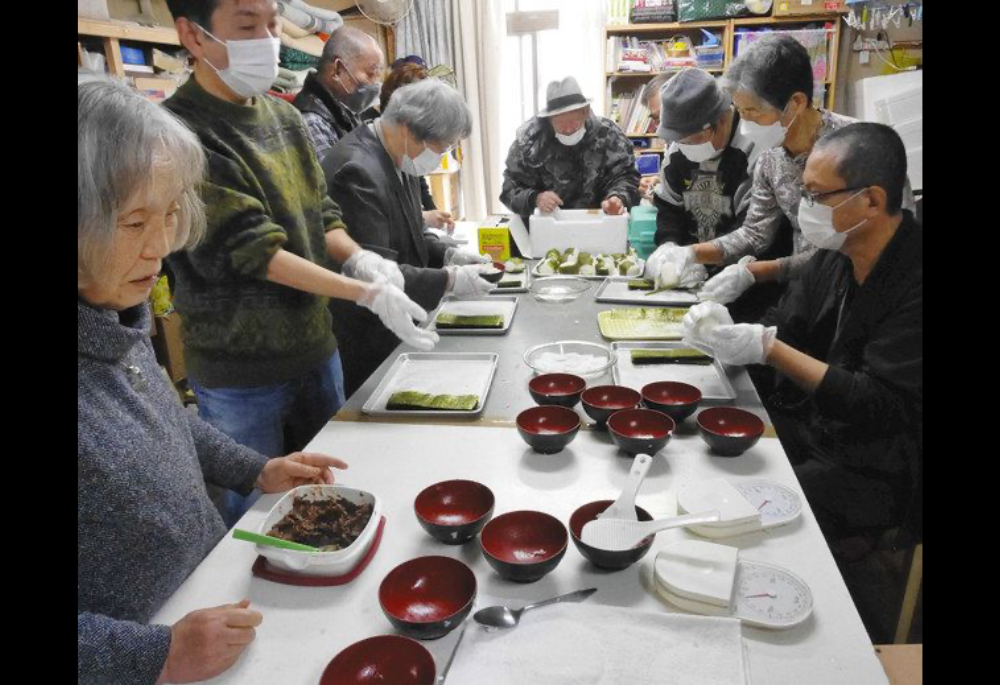
Sisters minister with other volunteers at a local soup kitchen. (Courtesy of Shizue Hirota)
With its neoliberal economy, Japan is the third-largest economy in the world, but its profit-oriented system does not prioritize life at all levels. As of 2022, Japan ranks only 54th in the World Happiness Report, a measure of whether people feel happy or satisfied. It is 116th in The Global Gender Gap Index 2022 rankings, making it the lowest ranked country for the gender gap in the region of East Asia and the Pacific. According to the European Parliament (based on a 2020 briefing), in terms of age distribution, "28.7 % of the population are 65 or older" and "by 2036, people aged 65 and over will represent a third of the population." This reality requires the active participation of migrant workers to maintain the system and structures of the economy.
This reality has brought a demographic shift in the Catholic Church in Japan. The Catholic Church in Japan has always been a tiny minority church of about 3% of the total population (in 2021, there were more than 400,000 Catholics among a total population of about 125 million). Lately, the number of Catholics is estimated to be more than 1 million because of the presence of non-Japanese Catholics.
The church has become a multicultural, multilingual, and multiethnic community because of the presence of migrant workers from Vietnam, the Philippines, Peru and Brazil. The number of non-Japanese Catholics could be bigger than the number of Japanese Catholics, though there are no reliable statistics. This reality challenges the Catholic Church to be genuinely inclusive and intercultural. Including non-Japanese Catholics is a pastoral priority at the level of diocese and parish.
Consecrated life in Japan plays a vital role in making the church more intercultural, primarily through the members who speak languages other than Japanese. There are many congregations of consecrated women in Japan, many of whom are of Western origin from the days when missionaries from the West came to Japan and founded their houses.
But it seems to me that new sisters stopped coming to Japan some time ago. As in the Western world, consecrated life in Japan faces the problem of aging and fewer vocations. Some congregations, including the congregations founded in Japan, began accepting aspirants from other countries of Asia, especially from Vietnam. The challenge of interculturality is a real issue, especially for congregations that have never had members other than Japanese.
Most non-Japanese Catholics in Japan are migrant workers who face multiple problems of human rights violations in society and at the workplace. Over 40,000 Vietnamese young men and women are in Japan as recipients of the technical internship system. The foreign technical internship program was established in 1993 to transfer skills to developing countries. The international community has long criticized the Technical Intern Training Program as a system that breeds human trafficking and forced labor.
Some of the problems that women face are maternity harassment and denial of reproductive rights. Some companies dismiss workers if they become pregnant. Other problems are low wages under unjust working conditions, labor accidents with no health coverage, illegal recruitment abroad, and illegal dismissal: In some cases, the applicants pay up to $10,000 to the agency before departure.
There is forced repatriation, workplace abuse, power harassment, sexual harassment; their freedom of movement is restricted, with no possibility of changing one's work. As The Mainichi reported in 2018, "As many as 69 foreign technical trainees died from 2015 through 2017, including 12 who were killed in accidents during training and six who killed themselves, according to a Justice Ministry analysis of reports from businesses that hired those and other trainees."
Advertisement
Living in Japanese society is difficult because of existing racism against those who "look different." The culture of Japan finds it challenging to accept and welcome diversity. Homogeneity is imposed. For example, a mother scolds her child, saying, "Don't do that. If you do, everybody will laugh at you." "Nobody is doing that." Calling a person "different" is a negative remark.
The education system is elitist, even ranking kindergartens according to the number of children who pass the entrance examination for the top primary schools. Society in Japan is stressful, and people do not feel free to be themselves.
We women religious try to discern our evangelical mission in today's Japan as we contemplate this reality. We believe that we are called to be an inclusive community of women and men where people feel welcome and accepted as they are.
Catholic sisters, brothers and priests actively assist the migrant trainees, providing them with legal assistance, means for daily needs, and accompaniment. Many trainees even faced starvation during COVID-19, and many religious congregations organized emergency support for food, health and finance.
Talitha Kum Japan tries to respond to the challenge with:
- Information dissemination and awareness-raising: organizing webinars, participating in the World Day Against Trafficking in Persons, and publishing newsletters twice a year in Japanese and English;
- Support for victims of trafficking in persons, with a shelter survey and call for cooperation for the protection of victims; provision of a trainees hotline; visits to base shelters; and emergency temporary protection and assistance funds;
- Participation in national and international networks against human trafficking, to demand the government abolish the state-sponsored trainee program; we also promote the Youth Ambassador program.
Six of us representing Talitha Kum Asia participated in the General Conference of the Federation of Asian Bishops' Conference, or FABC, held in Bangkok from Oct. 12-30, 2022. Our Talitha Kum international coordinator, Maryknoll Sr. Abby Avenlino, and Asia coordinator Sr. Paula Phonprase of the Sisters of St. Paul of Chartres, strongly appealed to the participants to commit themselves to a world without human trafficking. Cardinal Vincent Nichols, president of the Bishops' Conference of England and Wales and president of Santa Marta Group, founded by Pope Francis to end human trafficking, exhorted them to dedicate time and efforts toward stopping human trafficking.
The final message of the 2022 FABC General Conference expressed the church in Asia's commitment to reach out to the peripheries, to ecological conversion, to genuine dialogue, and to bridge-building in order to address the real issues that threaten life at all levels. We, as consecrated women, are called to make the commitments real in today's Asia, making the feminine face of God visible and tangible.

